
headlines
At the beginning of this year, the Central Bank of Cambodia announced that it would launch a blockchain-based national digital currency in the first quarter of 2020. However, as of now, the currency, called "Bakong", has not yet fully started operation. Chea Serey, the governor of the National Bank of Cambodia, told reporters on July 27 that Bakong has started trial operations this month and is expected to start in this quarter, probably before the end of the third quarter on September 30. officially run. It is reported that the project has been supported by 11 domestic banks. Serey noted that more banks are expected to join the project in the near future.
digital currency
South Korea's famous beach attraction Haeundae rental service will support cryptocurrency payments
According to Dai Stats data, the total number of MakerDao stablecoin Dai exceeded 300 million, reaching 301 million. Among them, 76.28% of Dai is generated by mortgaging ETH, 15.78% of Dai is generated by mortgaging USDC, and 6.62% of Dai is generated by mortgaging WBTC. Currently, more than 2.38 million Ethereum and 3774 Bitcoin (WBTC) are locked in MakerDAO.[Original link]
People familiar with the matter: Robinhood may slow down the advancement of cryptocurrency business
Data: The total circulation of Bitcoin-anchored coins exceeded 20,000
Data: The total circulation of Bitcoin-anchored coins exceeded 20,000
According to Debank data, as of now, the total circulation of Bitcoin-anchored coins issued on other blockchains has exceeded 20,000, and a total of 20,092 Bitcoin-anchored coins have been issued, an increase of nearly 70% this month. Included in the statistics include WBTC, renBTC, sBTC, imBTC, HBTC, BTC++, pBTC and tBTC. Among them, WBTC has the highest share, with a current circulation of 15,521, accounting for about 77%, followed by rebBTC, with a circulation of 1,854.
Data: More than 210,000 ETHs have been mortgaged to the Ethereum 2.0 testnet
According to previous news, the multi-client test network Medalla is scheduled to be launched at 21:00 on August 4th. The launch of Medalla requires 16,384 validators and a deposit of 524,288 ETH. If the number of validators does not reach the minimum requirement of 16,384 at 21:00 on August 2, the launch will be postponed.
Blockchain industry
BSN China and international official website will be updated at the end of July and early August
Five Yunnan characteristic industry enterprises signed an agreement with Alibaba Cloud Computing Co., Ltd., marking the official launch of China's first blockchain commodity code "Peacock Code". The first batch of enterprises using the "Peacock Code" covers industries such as Pu'er tea, honey, nuts, fruits and vegetables, and latex. They will use "one product, one code" to upload the information of each link of product production and circulation to the chain, and use the traceable and non-tamperable characteristics of the blockchain to integrate anti-counterfeiting functions into the products.
Investment and Financing
'Challenger bank' TransferWise closes $319 million funding round at $5 billion valuation
Iran authorizes power plants to mine Bitcoin
global policy
Nigerian Attorney General Has Sent Bitcoin Bill to National Assembly
In an effort to cleanse the digital space, the Nigerian government is working on e-money regulation, which will bring clarity to the regulation of the bitcoin industry in the country. The country’s justice minister, Abubakar Malami, said in a statement on Tuesday that the Ministry of Justice has submitted the bitcoin bill to the National Assembly, which, if approved, would provide a legislative framework for all digital currencies in the country. “It is expected that the bill will prepare Nigeria for emerging things such as digital cash, bitcoin and e-money,” Malami said.
Iran authorizes power plants to mine Bitcoin
Mostafa Rajabi Mashhadi, vice president of the Iranian Electricity Generation, Distribution and Transmission Company (Tavanir), confirmed that Iran’s power plants are allowed to mine cryptocurrencies, IRNA reported. Mashhadi explained that entities must apply to the Ministry of Industry, Mine and Trade (Ministry of Industry, Mine and Trade) for the necessary licenses and comply with the tariff regulations for crypto mining: “Power plants must submit their requests and follow crypto mining regulations. The fee standard approved by the currency mining center."
Mostafa Rajabi Mashhadi, vice president of the Iranian Electricity Generation, Distribution and Transmission Company (Tavanir), confirmed that Iran’s power plants are allowed to mine cryptocurrencies, IRNA reported. Mashhadi explained that entities must apply to the Ministry of Industry, Mine and Trade (Ministry of Industry, Mine and Trade) for the necessary licenses and comply with the tariff regulations for crypto mining: “Power plants must submit their requests and follow crypto mining regulations. The fee standard approved by the currency mining center."
Masayo Amamiya, deputy governor of the Bank of Japan, said that the Bank of Japan currently has no plans to issue a digital currency, but will consider the idea.
Character·Voice
Justin Sun: Tencent disrupted the situation halfway, and the bet with Wang Xiaochuan was over
Gavin Wood wrote an article in response to the questioning of the avalanche protocol: the avalanche protocol is neither secure nor scalable
On July 28, a member of the Avalanche Protocol collected some questions about Polkadot within the Avalanche Protocol community and posted them on the Polkadot Riot official group. The specific questions involved Polkadot’s scalability, slot mechanism, and cross-chain performance .
BB: The EOSIO roadmap will be updated soon, and details and long-term goals will be announced
Block.one CEO Brendan Blumer (BB) tweeted that EOS released a strategic vision in June last year, and since then, the team has completed a lot of work. The team is working hard to build EOSIO into the most robust public and private blockchain infrastructure.